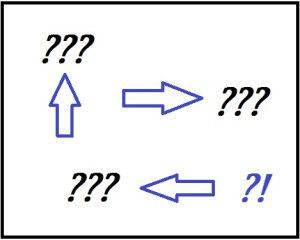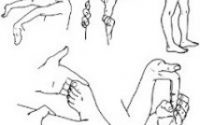Handling Change
 I’m writing this post ahead of what is likely to be a day of great change for many if not all in the greater Ehlers-Danlos community, if not the world (whether they all know it or not, smile).
I’m writing this post ahead of what is likely to be a day of great change for many if not all in the greater Ehlers-Danlos community, if not the world (whether they all know it or not, smile).
It is Monday March 13, 2017 as I type this, and we are all waiting on tenterhooks for the new EDS noslogy, which is just a fancy way of saying new diagnostic criteria to come out this coming Wednesday March 15, 2017 in the American Journal of Medical Genetics which yes, is behind a paywall. (Please honor this copyright, thank you.)
You can’t access the full articles there without paying though, so many are quite upset at what feels like another barrier to this super hot information we really want to see.
Since so many of us are being poodles on their pantlegs and out of a practical need to get the information out as far and widely as possible, the international scope Ehlers-Danlos Society (aka “The EDS” get it?) has promised to post them FOR FREE as soon as humanly possible with the permission of the American Journal of Medical Genetics.
However, they will not be out BEFORE March 15th, so if it is not March 15th, 2017, they are not out yet, okay? :) Yes, a couple of related articles have been published earlier behind the pay wall, but the actual full EDS diagnostic criteria (aka “nosology”) will NOT be out until Wednesday March 15th no matter how badly you want them, free or not.
I am being emphatic, because I’m finding our community to be one of the single most impatient and highly anxious I have ever ever encountered. (And I thought I was impatient!) Heh, my doctor has no idea how good he had it with me. Hey, I only waited five years to finally get some cromolyn sodium recently covered by my health insurance while my colleagues had it covered the whole time – but no, I’m not patient, sigh.
I’ve watched many of you get and have access to much better care and doctors than I have all this time, trust me. I smile when some of you complain about traveling 2 hours to see some of the best doctors back east in the US. Most of us out here in Oregon have to travel across the country to see those same specialists, or a minimum of 3-4 across state. Try 2 days and 2 thousand miles of travel and often $2000, okay? Then we’ll talk. But you don’t hear me complain now, do you? No, I just get on with making lemonade out of my lemons along with my colleagues.
But furthermore, I’ve watched while a small, but very vocal minority of the community literally lost their shit all over Lara Bloom and The EDS as they shared an FAQ ahead of the criteria’s publication two weeks ago to help ease their enormous workload answering questions from this incredibly anxious and demanding population (us). I for one apologized to her and the EDS on behalf of the rest of the community because we know that they are working their butts off doing their best to pave the way and deal with these high levels of anxiety in us.
Not everyone was given good tools for coping with change. Clearly some got more than others, and some could use a bit more help.
So I wanted to address dealing with change in general just a bit since it seems to be a challenge for our community in general – not just around this very real and valid medical literature update. This is a historic moment in EDS history, and my heart goes out to all who paved the way for me and others to be here posting about it as it is increasingly recognized, thank you.
But I’m finding that a good number of us tend to really struggle with change in general, myself included. We tend to be a little (or more) rigid in our thinking and behaviors – wishing for some things to happen at the same time every day, or in the same order, or in the same way. And to fail to believe in our selves and have faith in the future despite hands extended to us in help.
E.g. I could set my watch by my dad in my childhood – he ALWAYS got home at the exact same time (or very nearly) with rare exception, and performed the exact same ritual upon arriving: Hang up his coat, slip on his comfy moccasins, set his coffee thermos on the kitchen counter, go pee, come back out to the kitchen, pour himself a cup of now cold left over Folgers coffee from the Corningware percolater I grew up on, grab a handful (probably the exact same number) of Planter’s peanuts from the container on the end of the book shelf, and sit down and read the paper on his end of the couch while smoking a Lucky Strike cigarette. (Or three. He chain smoked, so I didn’t keep count.)
No asking how my day was at school. No listening, even if I tried to tell him – all I got were grunts, until he was done reading the paper and then, and only then, maybe, I might get his attention for a fleeting five minutes before he was onto his next ritual: a nap on the couch for 30-60 minutes followed by the first evening martini. With a green olive in it. (My mother was either drunk or absent after she left when I was ten, so no help there.)
If life conspired to prevent the above ritual (such as one of us having an injury or illness), he would deal with it – but it was clear he was very unhappy. So we didn’t disrupt this routine if we could help it. I learned to put my needs second or more often, last, to be not only not heard, but often unseen as well. (Yes, it took years to find my voice, thanks to all who helped.)
But I now observe this type of behavior in my fellow patients, helping me realize we all share aspects to some degree or another of this trait of rigid behavior and thinking, some more than others.
No, NOT ALL. I did not say all, now, did I? A handful of you are quite the opposite however, relishing chaos – this post isn’t for you natch! (Stop being so black and white!)
This is where the problem lies – leaping to often if not always erroneous and hasty conclusions, and then sticking to them like glue and over-reacting to them long before the evidence is in that this is correct or even necessary. Leading to oodles of wasted energy and unnecessary drama from such misunderstandings and communication breakdowns.
I call this sticky thinking or “velcro-brain”. I know, I have it too, just a bit more mildly than my dad and many of you. I deal with you in the support groups after all, trust me, I’m getting used to it. You’re all variations on a theme of my family minus the alcohol. (I’m finding it most common in those diagnosed with ADD for what it’s worth, but that’s just my unscientific observation.)
I have always craved routine, and security and stability – even long after I healed from the chaos of my alcoholic childhood home, i.e, having nothing to do with said chaos. It is my wiring, how I am. My neurology if you will. Whatever label you want to give it: Aspergers, OCD, ADD, I don’t care. (I think it’s a soupy combo of some of all of the above myself.) Bottom line:
I don’t like change.
And neither, I’m finding, do many of you. (Again, not all! I can’t say that enough, smile.)
But I realize this upcoming change, with its threat of potentially losing a very very hard fought and hard-won diagnosis represents more than the usual level of loss for some of you. Hey, I might be one of you who loses her diagnosis too, we don’t know yet – I’m waiting to see also. But after waiting for well over 25 years, and being dismissed as “just depressed” and my fav, “just a woman” (heh) to get my first proper diagnosis only after I very suddenly became a completely and totally shattered body in a wheelchair at 45 (five years ago), trust me, I don’t want to lose my diagnosis of hEDS and all the medical validation that brings finally either!
But… I will live, even if I do lose that label. First off, because I now believe in myself, even if some over-opinionated (likely rigid and mildly or more OCD) doctor doesn’t also.
And also, because we won’t lose the medical validation and new-found knowledge we’ve uncovered all these years. Yes, our diagnosis may change FROM “hypermobile EDS” TO the new, very real, very medically valid category of “Hypermobility Spectrum Disorder” or HSD. But guess what? I haven’t changed a spot despite the label change. Heck, our condition has been written off as “just depression”, hypochondria, somatoform and conversion disorders and Munchausen’s for years. I can handle HSD a whole heck of a lot better than the others TYVM!
And guess what else? The Ehlers-Danlos Society and myself will not stop advocating for you.

Even if you don’t meet the new criteria of HSD for that matter. Trust me, the medical world is slowly waking up, and realizing we fall on more of a spectrum than they realized before, and that not only can the condition change from seemingly totally benign to life-altering as mine did, but it also varies within a family, even between identical twins!
So obviously there are other environmental and epi-genetic factors at play we aren’t even fully aware of yet that lend to the expression of the hypermobile form of the condition at least.
It may be years before we fully uncover all the causes and drivers of what is currently called hypermobile type EDS and now HSD for which there is still no single known genetic mutation for the vast majority. (I don’t count the rare Tenascin-X subset – they’re truly rare, even more rare than vascular EDS cases okay, Miss Pendantic?) I’m talking about the vast majority, most of whom get diagnosed currently with fibromyalgia if anything at all besides “depression”. Or any of the other myriad common major comorbidities I’m personally finding comes with this package for as yet unknown reasons.
As I continue to assert, in my opinion, at least the hypermobile type of EDS is not rare, just rarely diagnosed. (Or at least, what used to be called hEDS.) Castori et al cited as high as .5-2% may have it in 2012 here! (That’s up to 1 in 50 people folks – far from rare! Others have cited at least 1 in 100, or 1 % elsewhere in 2013.) If it’s now easier for doctors to believe in the new category of Hypermobile Spectrum Disorders than hEDS, then so be it. At least they’re realizing something is going on that isn’t “normal” and can lend to easy injury and our myriad comorbidities.
And I can’t help adding that I’m finding the same rigid behaviors and B&W thinking I find so common in our EDS families to be quite common in our doctors. Hmm, fancy that! I almost think we’re likely all related. Gee, ever notice how many doctors and nurses we have in our families? Quite a few! I.e, we are literally all battling each other! Oh the irony, sigh.
So it’s not the message, but the delivery that needs work. Your feelings and concerns are valid, but don’t let your fear get the better of you and make you over react. Take a deep breath, step back, and try to have faith that I and thousands of others including The EDS have your back, literally in some cases. And we will not stop fighting for you to be seen, heard and believed, I promise. No matter what they want to call it, okay?
Meanwhile, I urge reading my post on Anxiety and EDS for some tips and insight into what might be driving some of this seemingly disproportionate anxiety. Again, the underlying concerns are valid. It’s just not the message, but the delivery you may wish to work on.
I’ll lastly close with the pro-tip that many of us are also battling narcissists, both in our families and in our doctors. (This disease seems to select for same.) Again, not all. But some. And if you find someone is completely not listening to you, or misunderstanding you or twisting your words, or totally ignoring or invalidating you as my late father used to do (bless his pickled soul), then walk away and save your spoons! Trust me, they are not worth your energy. Do not give them so much power over you, okay? Believe in yourself, know you’re right even if they won’t admit or recognize it, and pick your battles.
Find another doctor as needed when able. Notice I didn’t say “if”. It’s always possible, even if it’s not always easy. I’ve seen patients with nothing scrape up the change to fly across the country or even the “pond” to see the best specialists in the world. The internet is a powerful tool. Remember, it took me 25 years to be properly “seen” and “heard” finally, and I was dismissed by almost all of my prior doctors that whole time, not just my PCP of 15 years at that point. In his defense, he’d been misinformed about EDS being so rare when my form probably isn’t right? Whence I’ve forgiven him – and brought him with me. (He was open to my diagnosis once he could “see” it finally thankfully.) NO, it shouldn’t take becoming a shattered body to be ‘seen” and heard. Why do you think I’m writing so much now?? 😉
And if it’s a friend, partner or even your own family member who refuses to believe and validate you, find someone else who DOES love and believe you to talk to okay? Save your spoons! (Energy.) We have precious few, and you need to conserve them for staying as well as you can despite this painful package. Just because you’re related doesn’t mean your family will automatically love you the way you probably deserve, okay? And when they don’t, we have to love ourselves instead. No, it’s not fair, but I promise, life is better when you stop trying to change them (cuz we can’t, actually), and just take care of yourself instead. (Ask any ACOA or AcON you can find.)
I believe you, okay? Hang in there! We will get full and proper recognition for ALL of us in time. Nothing worth doing is ever easy. And all good things come in time. Heck, neither of my now clearly symptomatic (in 20/20 hindsight) late parents got diagnosed right? No wonder they drank! They were self-medicating, as I bet a lot of our homeless population is. I probably would have too in their pre-internet shoes. Keep the faith, it’s getting better, even if it doesn’t feel like it yet.
With love and all the support I can muster for ALL of you, patient or not,
Jan March 13, 2017

I hear you about staying calm and level headed. We who have EDS must keep our wits about us, despite living in a world that lacks the depth of understanding oftentimes we need. Ours is a continuous fight with no end in sight at this point. Such is life.
My over seven year battle for SSD has taught me that, and it’s still ongoing.
We must focus on getting the justice we deserve and while always staying rational in our quest for it. We can’t let our obstacles defeat us, and the only way to get what we deserve is to not let our opponents psych us out.
Let’s use our intelligence to overcome our weaknesses and tendency to lose focus. We know the truth of our hideous disorder. Whatever comes our way we can handle. There’s always new approaches to any problem when you relax a bit and think about it.
We shall overcome.
Yes, we SHALL overcome BirdLover, one day, doctor and diagnosis at a time. Hang in there, keep pounding that drum, and slowly but surely we’ll turn this huge ship by degrees in the right direction all together.
THe key being, believing in yourself even if no one around you, whether related (family) or medical (doctors etc.) seem to believe you. Trust – and heal – your gut, always, I say. I knew deep down for years there was something more going on that just “eating right”, although that has played a large role in my recovery.
I was right, but I had to fall apart before I was believed. (Story of my 5’4″ petite female life, sigh. Hello! Is this thing on? I’m down here!!)
The internet is also helping. Look how we’ve connected here. And I’m connected with many thousands online in Facebook and on Inspire. I channel you all daily and in all of these posts. I hope I’m reaching a few doctors out there. We know you’re not all jerks, and I’m trying not to let the few who are ruin it for the rest of us.
Hang in there my fellow zebras. Stay calm, and meditate and medicate on. You can and will prevail, but not if you don’t believe it.
I believe you. And in you. Hugs. Jandroid x
Thanks